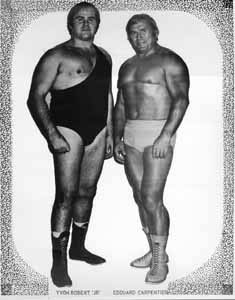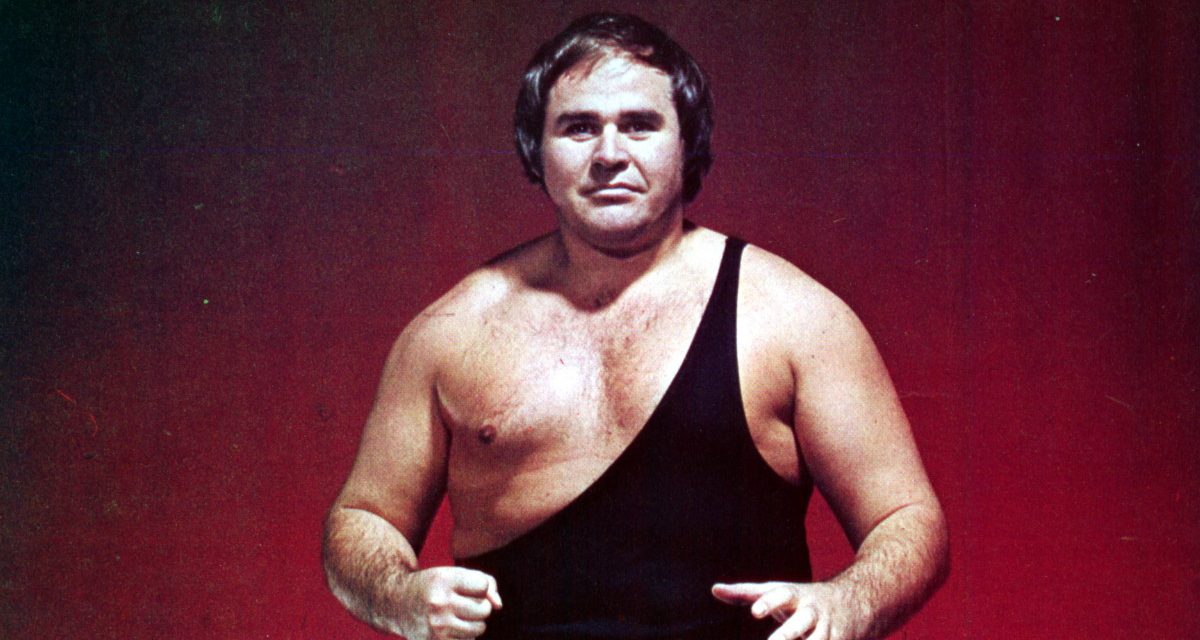REAL NAME: Yvon Robert Jr.
BORN: Montreal, Quebec
DIED: April 30, 2008
6′, 240 pounds
AKA: Bob Brunnell
Yvon Robert Jr.’s wrestling career lasted about only eight years, but it was a lifetime in coming.
As the son of French Canada’s greatest wrestler ever, the legendary former world champion Yvon Robert, Junior was constantly asked about whether he’d be following his dad into the squared circle.
“You know when you’re born the son of somebody, they always ask, ‘Are you going to do like your father? Are you going to do like your father? Are you going to do like your father?’ In those days, [wrestling] was so popular, and doing so good,” he recalled for SLAM! Wrestling.

Yvon Robert Jr. and Edouard Carpentier
Robert Jr. resisted the call as best he could, playing football and wrestling amateur. He even ventured to California to attend UCLA and earn his MBA. It was a bit of an awakening to return home to Quebec. “When I came back, I was probably one of the first MBAs in the province of Quebec in 1966,” Robert Jr. explained. “So I said, ‘Wow, they don’t have a place for me here. It’s still the old mentality of, ‘If you’re out of McGill, you’re okay.’ UCLA? They didn’t even know where it was.”
His father owned many clubs and businesses around Montreal, and turned to his son to help him sell them off after Expo ’67. Robert Jr. found himself working out with Edouard Carpentier to keep in shape, and one thing just led to another.
“I said, ‘After the Expo, dad, I think I’m going to try it.’ He said, ‘It’s up to you,'” Robert Jr. recalled. “I didn’t want to get to 60 years old and regret not having tried.”
Robert Jr. thought he would try wrestling for one year. “If it suits me, okay. If it doesn’t, it’s going to be out of my mind for my life. I’ve tried it. I did it, and that’s it. Goodbye, thank you.”
Tony Lanza and Carpentier were his trainers in Montreal. Then he was sent me to Pat O’Connor in Kansas City to get more training. After K.C., Robert Jr. ventured to Omaha, Nebraska, where the Dusek brothers promoted.
During this time, he wrestled as Bob Brunnell. “I didn’t want it said, ‘Yvon Robert Jr., who trips on his feet, doesn’t represent the old father.” Plus, he knew that his father had a few enemies as well. “If there were scores to settle, at least they wouldn’t settle with Bob Brunnell, who was an unknown!” he laughed.
From Omaha, he went to work for Verne Gagne in Minneapolis, where he also worked in the front office. Stints in Oklahoma, Florida, North Carolina and others followed.
Then the opportunity to reclaim his name was about to present itself.
“One day after two years on the road, I come into the dressing room after my match. I had won with a rolling short-armed scissors, like my father used to win his matches,” he recalled. “My father was there. I said, ‘My God.’ It was the first time he’d seen me wrestle in two years. He said, ‘You’re ready for Montreal.'”
Robert Jr. was, of course, thrilled that his father thought that he was ready to return home, where the glare of the spotlight would be that much more than the anonymity of Bob Brunnell. But his father was a seasoned veteran by this point, having wrestled since the 1940s. Robert Sr. now knew that promoting was where the money was at. As Robert Jr. puts it, “[it’s] the man that smokes the cigar that makes the money, not the guy who puts on his tights.”
Together, father and son started working towards a new promotion/organization in Montreal. Armed with his MBA, Robert Jr. was an ideal choice to balance out to the saavy veterans that worked with them. Maurice and Paul Vachon, Carpentier and Verne Gagne were among the backers of Grand Prix Wrestling in 1971. The wrestlers were partners in the promotion “to be sure that we could count on their backing, loyalty.”
Junior got greater satisfaction out of the business end of things than he ever did in the ring. “I developed Grand Prix and started to get the guys in. Mad Dog, Carpentier had some contacts with some wrestlers in the States.”
Grand Prix started promoting in Verdun, Quebec and it took off from there.
While Robert Jr. would still don the tights to wrestle, he could never hold a candle to his father’s accomplishments. “My career move was mostly administration than trying to win a belt. Because if you’re the son of somebody, you know you’re going to be criticized all your life. And you get that, ‘Hey, you’re not as good as your father! ‘Hey, you’re not as good as your father!’ I said, ‘You’d better believe it. Nobody was as good as my father, so nobody could do it.'”
He keeps a quote in his wallet, French text written by author Victor Hugo that says “C’est qui etez faite et bein faite des plus a l’affaires.” Loosely translated, it’s an admittance on his father that he could never top his father. “What is done and well done, is not to be re-done.”
“In my mind, I knew I was going [to Montreal] to give the best of myself, but I would never be the equal of my father,” Robert Jr. explained. “So I did not have the complex of the son of an athlete trying to match him. I said I could be as good if I have an organization that promotes wrestling.”
He got out of wrestling when he sold off his interest in Grand Prix. In 1977, he started selling real estate, which allows him the freedom to spent his time as he wants. One of his current passions is arranging a Cauliflower Alley Club reunion in Montreal in the fall, but that has been hampered by a recent two-month stay in the hospital for a partial foot amputation.
“I’m recuperated,” he said. “But now I have to put my mind on doing all the things that I’m supposed to.”
RELATED LINK

